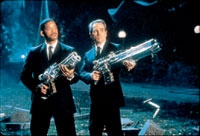DVD Insider: Barry Sonnenfeld

He's kidding, but the truth is that Sonnenfeld has a reputation for making his words count - which is why we've come to the screening room of his postproduction office in East Hampton, New York, to hear what he has to say about movie theaters vs. home theater, his own movies, and the amazing rise of DVD. While Sonnenfeld doesn't tend to show a lot of emotion, it quickly becomes apparent that he never pulls his punches.
As an A-list director, Sonnenfeld spends a lot of time in movie theaters, but, like a lot of people, he doesn't enjoy the experience anymore. "I'll go there and hear dialogue coming from the surrounds because the center channel is blown out," he says. "Or I have to buy new sneakers because they just melted from years of Coke syrup and gum on the floor."
 Sticky floors aside, is it really that bad? Sonnenfeld responds by recounting his experience opening Men in Black at one of America's premier theaters, the Loews at 84th and Broadway in New York City. "I went in there two days early to hear the sound system, and not one of the six theaters had a subwoofer. I asked the owner, 'What's going on here?' And he said, 'Well, the subs were buzzing, so we disconnected them.' I made them spend the next two days stealing subwoofers from other theaters. We even took them from the Loews on Astor Place where Armageddon was playing."
Sticky floors aside, is it really that bad? Sonnenfeld responds by recounting his experience opening Men in Black at one of America's premier theaters, the Loews at 84th and Broadway in New York City. "I went in there two days early to hear the sound system, and not one of the six theaters had a subwoofer. I asked the owner, 'What's going on here?' And he said, 'Well, the subs were buzzing, so we disconnected them.' I made them spend the next two days stealing subwoofers from other theaters. We even took them from the Loews on Astor Place where Armageddon was playing."
For Sonnenfeld, subwoofers are a lot like tomatoes. "I can't understand in the summer how restaurants can serve greenhouse tomatoes when there's nothing but tomatoes being grown out here. It's the restaurant's job to serve good tomatoes. It's the same thing with movie theaters. If you're the owner, what's your job? Well, it's really to sell buttered popcorn. But why not be proud of having good projection and sound?"
His dire experiences as both moviemaker and moviegoer made Sonnenfeld a convert to home theater and DVD. "Any person who reads your magazine has better sound and picture in his home system than you'll get in 95% of the theaters in America."
While it's easy to see why most readers would have better sound - for starters, all of their speakers are usually connected - it's hard to believe that they have a better picture. "The brightness of people's TVs doesn't change radically like it does in a movie theater because someone didn't change the bulb when he was supposed to," Sonnenfeld explains. "So the image at home is brighter, with more contrast - more like what I intend when I make a movie. We can go to the plumber next door and see a better picture on his system from any DVD than if you put on a print of Big Trouble in the East Hampton Cinema."




























































